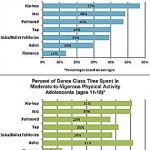Walking Pace and Risk of Heart Disease Linked in Study
Does your walking pace mean you're at a higher risk of heart disease? Study suggests that people who walk at a certain speed could be at higher risk of heart disease compared to the general population.
Study: Simple Leg Exercises Can Help Diabetic Heart Health
A UBC study has found that a few simple leg exercises can reduce the risk of diabetes complications, improve blood vessel function and lower...
Help Manage Diabetes: Take a Short Walk After Meals
New research from New Zealand's University of Otago suggests that people managing type 2 diabetes should walk after meals to gain the greatest blood...
Do Kids Get Good Exercise in Dance Class? Study Says No.
Most parents think that sending their child to dance class provides a good amount of physical activity and exercise. A new study found that...
Mild Exercise for Seniors Helps Arthritis and More
Researchers found that a low-impact exercise program for seniors helped decrease pain, improve mobility and enhance quality of life for most participants. It's never too...
Physical Activity and Type 2 Diabetes, Type and Timing Matters
New data about both the amount and timing of physical activity in reducing the risk of developing type 2 diabetes, as well as how...
Study: Exercise Harder for People with Diabetic Relatives
Exercise is good for everyone -- but some struggle more than others. Researchers have found that people with a family history of type 2...
Obese Women Convert Carbohydrate to Fat Faster Than Lean Women
De novo lipogenesis is the metabolic route by which mammals convert excessive dietary carbohydrates into fat. Given the prevalence of highly refined carbohydrates in the American diet, this process may play a significant role in the increase in obesity in the U.S. population.
Study Shows Which New York City Residents Spend Too Much Time Sitting Around
New York City is one of the most walkable cities in the county, yet certain groups of residents are spending way too much time...
Study: Amish Children Are 2-Times More Physically Active Than Non-Amish Children
Old Order Amish children are much more physically active and three times less likely to be overweight than non-Amish children, which may provide them with some long-term protection against developing Type 2 diabetes.
For Diabetics, Exercise Helps Control Blood Glucose, Trim Waist Size and Body Fat
How important is exercise to people with diabetes? Waist circumference, percentage of body fat, and hemoglobin A1c levels all improved in diabetics who exercised...
Partial Remission from Diabetes Linked to Intensive Weight-Loss Intervention
Participation in an intensive lifestyle intervention was associated with a greater likelihood of partial remission of type 2 diabetes.
Joslin Study: It’s Never Too Late to Start Exercising and Losing Weight
A new study shows that obese adults who lost just 7 percent of their weight and did moderate-intensity physical exercise for six months improved their major blood vessel function by approximately 80 percent, regardless of whether or not they had type 2 diabetes.
Metabolically Healthy Obesity: Exercise May Be the Key
Although obesity is a risk factor for diabetes and heart disease, some people who are overweight or obese are able to delay or avoid developing related key risk factors.
Exercise in Itself Improves Blood Glucose Control in Type 2 Diabetes
Exercise, dietary changes and medication have long been the cornerstones of managing type 2 diabetes. But few studies examine how exercise actually benefits these patients.
Study: 15 Minutes of Moderate Daily Exercise Lengthens Life
Taiwanese who exercise for 15 minutes a day, or 92 minutes per week, extended their expected lifespan by three years compared to people who are inactive, according to a study published in The Lancet.













